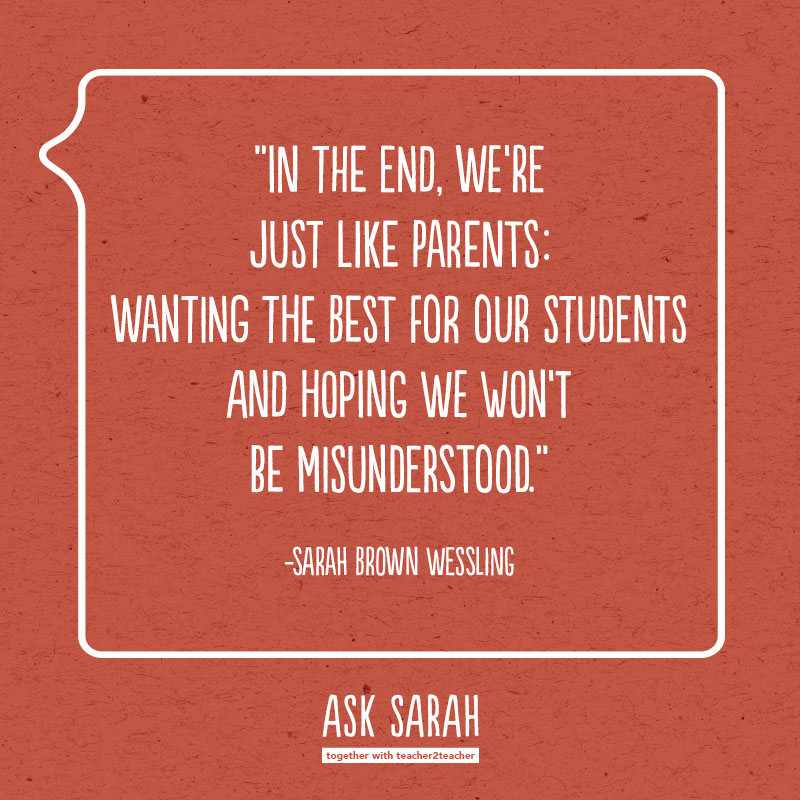

How do you handle a tough parent-teacher conference? And, then, how do you recover from it?
Sincerely,
Tough Parent Conference
These are inescapable teacher moments, hopefully tempered by all of the other conferences that weren’t so tough. I hope you can balance the tough conference with the one where you and a parent were able to celebrate an amazing young person. I hope this tough one was counteracted by the conference where you and a parent were able to talk productively and hopefully about growth areas for the child. I hope you will put into perspective this tough conference by holding onto the other bright spots of “thank you” or “my child loves your class” or “she’s challenged” or “he’s gaining confidence.” Nevertheless, the conversations that turn tough can leave you feeling unsure at best and defensive at worst. So let’s see what we can do to help you use this experience as productively as possible.
To address the first part of your question, during the conference itself, I try to stay as calm as possible. Even if my heart just took a surge of adrenalin and that voice in my head is trying out all of the exasperated replies I want to voice, I channel it all to listening. Sometimes I’ll even take notes. Just the act of writing down what I’m hearing keeps me focused on listening. I’ll try to picture the student’s face in my mind and remember what’s most important here. I nod. A lot. And use my best paraphrasing skills: “So what I’m hearing is that you’re worried the grade in this class will hurt his scholarship chances.” The first step is always empathy and this is when that student needs me to exercise it most.
If a parent is really upset, I know this won’t be the time when we build our bridge. This is the time I have to listen, offer clear rationales for my teaching decisions and focus on highlights of the student’s learning. I have to convey that nothing is fixed, that there’s opportunity for change and that I believe in a shared vision of success for this student.
But, of course, it lingers.
If you’re anything like me, you’ve probably replayed that conference over in your mind a hundred times. And each time, the reel gets a little longer as you stretch it out over the course of all the interactions you’ve had with this student since the beginning of the school year. You wonder what you said, what you didn’t do. You wonder if you did too much or not enough. You wonder if you’ve got it all wrong, if there are others who feel this way too.
It’s one thing to question, but it’s another thing to throw yourself into a vortex of self-doubt. So the work of recovery is to see the truth in the criticism, but be resilient enough to put it into perspective, to determine if your practice needs any shifting. Here are some productive ways to keep growing.
Consider the context. As you know, context is everything. It’s why knowing our students as individuals becomes so crucial. Perhaps the parent is reacting to her child’s insecurities that are being revealed at home. Perhaps the parent is afraid his child won’t be treated fairly because of a bad experience in a previous year. Perhaps the parent thinks she’ll be judged as a mother because her child struggles. Whatever lies beneath the surface of this tough conference is part of your student’s reality. It’s insight you need in order to meet your student with fresh intentions.
Gather insight from others. You must avoid that vortex and gathering more information is a way to do it.
- Reach out to the student in kind and genuine ways. Offer an apology for any miscommunication and decide how the two of you can move forward productively.
- Ask the entire class to give you some feedback on how things are going. A few of my favorite questions to ask: 1) Do you feel like you’re learning in this class? Why or why not? 2) What do you wish was different about this class? 3) What do you think I should know about my teaching? If you discover there are changes you should make, don’t be ashamed, just keep growing and make them.
- Seek out a colleague, a mentor, a coach or an administrator. Share your concerns and ask them to help you see what you can’t right now.
- Visit the school counselor. Often, counselors understand the student’s history in ways that could help you discover more about the best ways this student learns.
- Check in with previous teachers and important adults. More than likely, someone in this student’s previous experience has some meaningful advice on reaching him/her. It may be another teacher, a coach, a sponsor of a school activity, or an important adult outside of school. A quick inquiry could reveal valuable insight.
Think in loops, not straight lines. In the end, we’re just like parents: wanting the best for our students and hoping we won’t be misunderstood. So think and work in loops. Empathy and open communication are recursive and generative, not linear. And neither are you. So carry on, teacher-warrior!
Teach openly,
Together with Teacher2Teacher




Мастер +по ремонту стиральных машин.
Мастер на диагностику стиральной машины.
https://dzen.webbuzzfeed.com/23503307/%D0%A0%D0%B5%D0%BC%D0%BE%D0%BD%D1%82-%D0%BA%D0%BE%D1%84%D0%B5%D0%BC%D0%B0%D1%88%D0%B8%D0%BD-%D0%B2-%D0%A1%D0%B0%D0%BD%D0%BA%D1%82-%D0%9F%D0%B5%D1%82%D0%B5%D1%80%D0%B1%D1%83%D1%80%D0%B3%D0%B5
whyride
CBD, or cannabidiol, has been a engagement changer due to the fact that me. I’ve struggled with anxiety into years and have tried assorted https://mjcbdd.com/products/afghan-kush-delta-8-flower various medications, but nothing has worked as grammatically as CBD. It helps me to surface sang-froid and relaxed without any side effects. I also obtain that it helps with catch and pain management. I’ve tried a variety of brands, but I’ve bring about that the ones that are lab tested and play a joke on a good position are the most effective. Complete, I enthusiastically support CBD on the side of anyone who struggles with anxiety, be in the land of nod issues, or chronic pain.
I recently hired a contractor for some shelter renovations, and I should suggest that I am outrageously walking on air with their work – https://contractorfinder.geappliances.com/contractors-mascoutah-il . They were excellent, punctual, and went exposed to and beyond to safeguard that caboodle was done to my satisfaction. They were also altogether communicative all the way through the entire procedure, keeping me conversant with of any issues that arose and addressing them promptly. Overall, I quite approve this contractor to anyone in lack of eminence workmanship and uncommon customer service. Blame you!
I recently hired a contractor respecting some relaxed renovations, and I obligated to say that I am outrageously tickled pink with their work – https://contractorfinder.iko.com/contractors-red-deer-north-ab . They were expert, on time, and went superior to before and beyond to ensure that all was done to my satisfaction. They were also uncommonly communicative all over the unalloyed procedure, keeping me conversant with of any issues that arose and addressing them promptly. Overall, I highly propound this contractor to anyone in desideratum of rank innards and uncommon character service. Hold responsible you!
I’m in sweetie with the organic puss serum and lip balm! https://organicbodyessentials.com/products/cbd-oil-1500mg The serum gave my skin a youthful shove, and the lip balm kept my lips hydrated all day. Knowing I’m using bathe, straight products makes me feel great. These are right away my must-haves repayment for a full of vim and nourished look!